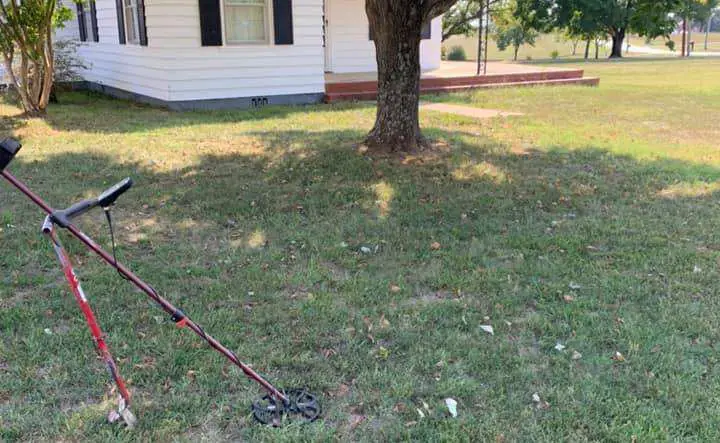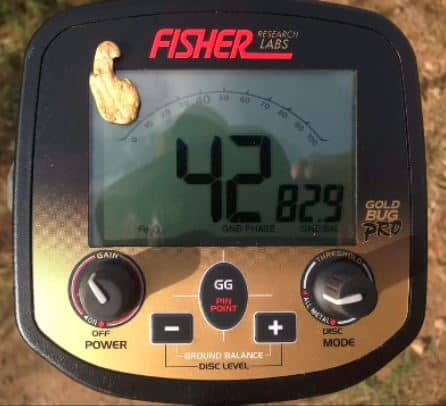
Idaho is a very good state for those who want to enjoy outdoor hobbies in general and metal detecting as a hobby in particular …
… Nevertheless, do that only after you’ve made sure that you know and understand the regulating laws! Don’t worry, I talk pretty deeply about that in this Post …
… In addition, I address these subjects:
- Locations that you should explore
- I recommend a good machine for the this state type of soil
- Several thoughts and ideas on Gold Prospecting in Idaho
- Few Clubs suggestions
- Rivers and Lakes to explore
Let’s get into that …
What are the metal detecting laws in Idaho?
The ARPA law is enforced strictly in Idaho in addition to the NHPA (National Historic Preservation Act). The two acts are made to ensure that no property deemed historically or culturally necessary is damaged by people.
Unfortunately, this prohibits metal detection hobbyists from any digging either. For that, you will need to have a permit from the state officials beforehand.
Metal detecting is not outlawed on lands beyond the purview of ARPA and NHPA. In fact, you can even go about digging without a permit. However, the State enforces claims on any item recovered thus, which would effectively make all your efforts useless. Hence, it is better to take permission before going on your adventure.
Idaho is also one of the few states that dictate that any treasure found on private land, whether excavated by the owner or anybody else, belongs to the owner de-facto.
Thus, apart from the permission to dig on private properties, collectors also need to have a written agreement with the property owner that the collector shall lay claim to any treasure, if found, on the premises.
In the state parks, you will need a permit from park rangers before doing any digging!
Where to go detecting in Idaho?
There is no shortage of places to explore in there! As you might have guessed, the mines are the primary locations to search.
The various gold and silver mines spread across the state often offer bountiful treasures for collectors too. Even in former mines, there are always creeks that could have deposits of precious metals that the miners had missed.
Boise Basin and Elmore County house some of the biggest gold mines in Idaho, while Owyhee County and Silver Valley has a history with silver mines.
Rivers and lakes can occasionally bring up something valuable, but it is a rare occurrence. Hence, they don’t form the primary or even secondary attraction for detectors in Idaho.
But there are other places that indeed hold a lot more attraction. Certain locations in Idaho has witnessed some historical, though mundane, events like logging haul and railroad construction.
These places have high chances of yielding relics that once belonged to these workers centuries ago. Idaho also has a very large forested area, most of which belong to the State. With a single permit, you can explore these vast areas and try your luck for finding something valuable.
This is a Good Detector for Idaho Soil!

For the most part, Idaho soil is suitable for detection purposes! Indeed, it has low-levels of mineralization and only a few pockets of significant clay deposits.
However, the ground is quite hard in most of the locations. Given the vast, remote areas away from civilization, it complicates things further for you. Digging up the ground to recover whatever you might have located would be a difficult task.
Since gold Detecting would be your primary motivation behind it, the Fisher Gold Bug Pro (Check it Here at Amazon) is a very good choice to have around.
The device is attuned to detect small pieces of gold in even highly mineralized soil. The digitized display sends details like ground condition in real-time.
It comes with automatic ground balancing, dual headphone jack, and continuous readouts. Operating at 19 kHz frequency, it weighs merely 2.5 lbs.
The special thing about Gold Bug Pro is its ability to match the needs of all types of detectorists, be it beginners, regulars or experts. While it is not suited to take in water, there are slim chances of that happening in Idaho!
Finally, if you are willing to invest in a technologically advanced machine, then you should Check My Favorite Device Here at Amazon!
Searching for Gold in Idaho
Idaho might not have seen a gold rush, but it has had a decent history with gold in other ways!
Indeed, the biggest gold haul the State saw was in Boise Basin in 1862, when miners unearthed millions of ounces of gold nuggets …
… Since then, the mines have dried up, and there is no commercial gold mining anymore. But the gold might still be present after all.
The towns that boast of some gold prospects are Placerville, Centerville, and Pioneerville. However, the best chances of finding gold are in the largest city of the state, Idaho City.
Atlanta, in Elmore County, is another excellent location to look for gold prospects. It saw some excellent gold mining in the 1940s and predominantly has placer and lode gold.
You might not be able to find any gold nuggets in Idaho. Fine gold pieces and gold flour are commonly found here, while incidents of finding pieces weighing more than a pound are rare.
It must be kept in mind that Idaho is a big state. Most of these gold sites are in remote locations, often miles away from civilization. If you plan to go gold hunting in Idaho, be prepared with all the essential supplies and spare parts.
By the way, I’ve spent several days writing this Gold Detection Article, I encourage you to check it out if you want to learn on how to come up with this valuable metal in a decent way!
What other finds should you expect there?
Idaho has a long and rich history of human activity, which only got magnified in the past three centuries. Thus, old metallic items like coins, weapons, and accessories are still buried across the whole State.
The state was one of the biggest ones for logging in the 19th and 20th century. Logging involved people are living together in remote areas, which also meant that many would have left back their belongings accidentally in the area.
These belongings would today be called relics. The same is true for the railroad building camps. Sweeping your metal detector in these areas can turn up something valuable for you after all.
Idaho also has great silver mines. Amidst the mountains of Owyhee County, the first silver mines were discovered in 1864.
Today the silver mining has stopped there, but the creeks are still said to be rich in silver. It is worth a trip just to check out the creeks and test your luck.
In Silver Valley, the mining still continues and coughs millions of ounces of silver every year. Here, you would definitely check your luck.
Although the mining companies canvass, mark, and restrict any area with high silver deposits, there could always be places they might have missed.
Detecting in Idaho Lakes and Rivers!
Unfortunately, Idaho doesn’t offer many opportunities near lakes and rivers. Since the most prominent attractions are around mines and valleys, the rivers don’t see much action!
However, the rivers near such mines often contain similar treasures and thus grab the attention of hunters!
For example, the Boise River near the Boise Basin is perhaps the most popular river to look for valuable items. Other rivers include Bear river, Big Lost River, Clearwater river, and Snake river.
As for the lakes, the chances are even more limited here. Idaho has its decent share of lakes. However, these lakes didn’t see much of historical events, unlike railroad or logging camps.
They also don’t have much underground deposit of valuable metals like gold or silver mines. But that doesn’t mean that visiting these lakes would be worthless.
In fact, lakes in Idaho see great tourist activity each year. This simply means that many valuable items, albeit modern, could be found along its shores. Some of the lakes worth checking out are:
- Priest Lake
- Lake Pen Oreille
- Lake Cascade
- Henry’s Lake.
For more info about this topic, I encourage you to check this Rivers Detection Post! You will learn a lot of new info, hopefully …
Are there detection clubs in this State?
Boise is perhaps the most bustling city for metal detecting hobbyists!
The city has a range of detection clubs open for anyone to join. Some big ones include Wampum Hunter Metal Detector Club and Idaho Gold Prospectors Association. There are also some clubs in Twin Falls and Idaho City.
For gold hunters too, Idaho has no shortage. The ample of mines in Boise Basin and Atlanta has made hold hunting a prominent hobby in the State.
Some good gold detection clubs are situated in Meridian, Boise, Hayden Lake, Parma, Idaho Falls, and Roberts.
It is easy to find dedicated clubs for finding Gold within close proximity to most major cities in Idaho. Since Idaho has large, remote areas to explore, it is always better to have a team with you.
Exploring Idaho Parks!
As mentioned earlier, the restrictions about digging in parks are the same in Idaho as they are in other US states.
State parks, and especially federal parks are very strict about their parks getting damaged by anyone. If you are caught doing it without a permit, you can be heavily fined or even jailed. It would be an unnecessary risk, given that permits to dig in parks are not hard to get.
Even more importantly, simply, this hobby is perfectly legal in Idaho parks. However, to be on the safe side, it is better to check with the park officials before bringing your instruments with you in the park.
Failing to do so could result in a misunderstanding with the park officials!
Getting your detecting permit in there
Interestingly, getting a permit in Idaho is not as tough as some other states!
Given the high volume of gold hunting in there, the state officials are somewhat okay with detection activities.
It is easy to get permits once you assure them that you would not damage properties and set them as before while leaving. For parks too, the park rangers are mostly okay with metal detecting in the premises.
While searching around the mines, it is important to seek permission from the mining company who lands you might be trespassing upon. For private lands, the consent of the owner is enough.
Conclusion
I don’t know how much did all this info resonate with you, hopefully, it did and you’ve learnt few new and helpful things for your detection journey!
My main goal was to make you a little bit more excited, unless you already are, to explore new territories! Indeed, that’s the best way I know to come up with the best possible finds …
… Finally, for more locations, please have a look at this article to approach metal detecting in Vermont!
